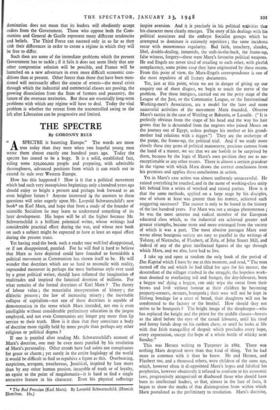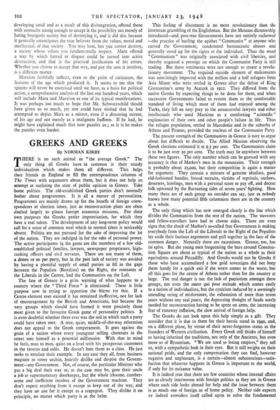THE SPECTRE
By GORONWY REES SPECTRE is haunting Europe." The words are more
A true today than they were when two hopeful young men wrote them almost exactly one hundred years ago. Today the spectre has ceased to be a bogy. It is a solid, established fact, ruling some 250,000,000 people and preparing, with admirable thoroughness, advanced positions from which it can reach out to extend its rule over Western Europe.
How has this happened ? How is it that a political movement which had such very inauspicious beginnings only a hundred years ago should enjoy so bright a present and perhaps look forward to an even brighter future ? Anyone interested iu the answers to these questions will seize eagerly upon Mr. Leopold Schwarzschild's new book* on Karl Marx, and hope that from a study of the founder of scientific Socialism he may learn to understand something of its later' development. His hopes will be all the higher because Mr. Schwarzschild is a brilliant polemical writer, whose writings had considerable practical effect during the war, and whose new book on such a subject might be expected to have at least an equal effect during the present truce.
Yet having read the book, such a reader may well feel disappointed, or if not disappointed, puzzled. For he will find it hard to believe that Marx as here depicted could have founded so formidable a political movement as Communism has shown itself to be. He will wonder that doctrines which are so hard to reconcile with reality, expounded moreover in perhaps the most barbarous style ever used by a great political writer, should have inflamed the imagination of multitudes and inspired the fanatical devotion of millions. For what remains of the formal doctrines of Karl Marx ? The theory of labour value ; the materialist interpretation of history ; the dihlectic process ; the law of increasing misery ; the inevitable collapse of capitalism—not one of these doctrines is capable of demonstration in the sense which Marx intended, not one is even intelligible without considerable preliminary education in the jargon employed, and not even Communists any longer pay more than lip service to their truth. How is it then that they constitute a body of doctrine more rigidly held by more people than perhaps any other religious or political dogma ?
If one is puzzled after reading Mr. Schwarzschild's account of Marx's doctrine, one may be even more puzzled by his revelation of Marx's personality. Other creeds have had saints not conspicuous for grace or charm ; yet surely in the entire hagiology of the world it would be difficult to find so repulsive a figure as this. Overbearing, suspicious, arrogant, treacherous, Jesuitical, inspired by hate more than by any other human passion, incapable of truth or of loyalty, an egoist to the point of megalomania—it is hard to find a single attractive feature in his character. Even his physical sufferings
* The Red Prussian (Karl Marx). By Leopold Schwarzschild. (Hamish Hamilton. 16s.) inspire aversion. And it is precisely in his political activities that his character most clearly emerges. The story of his dealings with his political associates and the embryo Socialist groups which he attempted to dominate is curiously repetitive ; the same incidents recur with monotonous regularity. Bad faith, treachery, slander, libel, double-dealing, innuendo, the stab-in-the-back, the frame-up, false witness, forgery—these were Marx's favourite political weapons. He and Engels are never tired of retailing to each other, with gleeful complacency, some prime coup they have engineered by these means. From this point of view, the Marx-Engels correspondence is one of the most repulsive of all literary documents.
Yet, just at this point, when we are in danger of giving up our enquiry out of sheer disgust, we begin to touch the nerve of the problem. For these intrigues, carried out on the petty stage of the League of the Just, or the Communist League, or the International Working-men's Association, are a model for the later and more successful activities of the movement Marx founded. Observe Marx's tactics in the case of Weitling or Bakunin, or Lassalle. (" It is perfectly obvious from the shape of his head and the way his hair grows that he is descended from the negroes who joined Moses on the journey out of Egypt, unless perhaps his mother or his grand- mother had relations with a nigger.") They are the archetype of the purge, the frame-up, the political trial. And if we study more closely these tiny gems of political manoeuvre, precious cameos from the hand of a master, we see that we are foolish to be surprised by them, because by the logic of Marx's own position they are as un- exceptionable as any other means. There is almost a certain grandeur in the vigour with which Marx draws the correct conclusions from his premises and applies those conclusions in action.
Yet in Marx's case action was almost uniformly unsuccessful. He ruined everything he touched, and in the name of working-class unity left behind him a series of wrecked and ruined parties. How is it that the same methods, applied on a large stage by his disciples, one of whom at least was greater than his master, achieved such staggering successes? The answer is only to be found in the history of the last hundred years. For Marx was not a unique phenomenon ; he was the most extreme and radical member of the European educated class which, as the industrial era achieved greater and greater triumphs, became more and more estranged from the society of which it was a part. The most abusive passages Marx ever wrote about bourgeois society are easy to parallel in the writings of Tolstoy, of Nietzsche, of Flaubert, of Zola, of John Stuart Mill, and indeed of any of the great intellectual figures of the age through which Marx, and we also, have had to live.
I take up and open at random the only book of the period of Des Kapital which I have by me at this moment, and read, "The man turned off the soil which he had tilled for ages for his master, the descendant of the villager crushed in the struggle, the hopeless work- man doomed to everlasting toil and hunger, the day-labourer, born a beggar and dying a beggar, can only wipe the sweat from their brows and lc:ok without honour at their children by becoming property-owners, masters, bourgeois ; their sons will not be kept in lifelong bondage for a crust of bread, their daughters will not be condemned to the factory or the brothel. How should they not strive to be bourgeois ? The bright image of the shopkeeper—who has replaced the knight and the priest for the middle classes—hovers as the ideal before the eyes of the casual labourer, until his tired and horny hands drop on his sunken chest, or until he looks at life with that Irish tranquillity of despair which precludes every hope, every expectation, except the hope of a whole bottle of whisky next Sunday."
This was Herzen writing to Turgenev in 1862. There was nothing Marx despised more than that kind of thing. Yet he had more in common with it than he knew. He and Herzen, and Flaubert too, and a thousand others, were children of the same age, which, however often it disappointed Marx's hopes and falsified his prophecies, however obstinately it refused to conform to his economic laws, progressively antagonised or disabused those who should have been its intellectual leaders, so that, almost in the face of facts, it began to show the marks of that disintegration from within which Marx postulated as the preliminary to revolution. Marx's doctrine, developing amid and as a result of this disintegration, offered those with stomachs strong enough to accept it the possibility not merely of hating bourgeois society but of destroying it, and it did this because it generally emancipates the true believer from the values, moral and intellectual, of that society. You may hate, but you cannot destroy, a society whose values you fundamentally respect. Marx offered a way by which hatred or disgust could be turned into active destruction, and that is the practical justification of his errors. Whether you choose to accept that way, and pay the cost it involves, is a different matter.
Marxism faithfully reflects, even to the point of caricature, the features of the age which produced it. It seems to me that the spectre will never be exorcised until we have, as a basis for political action, a comprehensive analysis of the last one hundred years, which will include Marx and Marxism as one of its typical manifestations. It was perhaps too much to hope that Mr. Schwarzschild should have given us so much, yet one could have wished that he had attempted to depict Marx as a mirror, even if a distorting mirror, of his age and not merely as a malignant buffoon. If he had, he might have explained much that now puzzles us ; as it is he makes the puzzles even harder.































 Previous page
Previous page